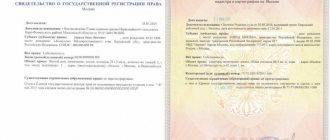How to find out the cadastral number
Dear readers! The article talks about typical ways to resolve legal issues, but each case is individual. If you want to find out how to solve your particular problem , contact a consultant:
8 (800) 700 95 53
APPLICATIONS AND CALLS ARE ACCEPTED 24/7 and 7 days a week.
It's fast and FREE !
To obtain information about an apartment, it is enough to know the address of the location of the object and the cadastral number. You can find out whether there is a mortgage on real estate on the electronic resource of Rosreestr or third-party sites. To obtain a cadastral record number, follow these steps:
The cadastral number reflects the characteristics of a particular property. It is an identifier of a specific apartment and distinguishes it from other buildings, residential premises, structures, etc.
An entry in the cadastre is assigned to housing once and is retained during the transfer of ownership of the object and during other disposal of property. The number changes when there is a significant change in the characteristics of the object, for example, dividing a residential building into two separate residential premises with separate entrances, which are listed as independent objects.
There are several ways to obtain a cadastral number:
- through the MFC or at the cadastral chamber;
- when producing a cadastral passport, information is entered into the document;
- in the certificate of state registration of rights to the property, issued by departments of Rosreestr;
- online.
The service is provided via the Internet through the Rosreestr website. in the section “Reference information on real estate objects”. To do this, you need to fill in the “Address” field, then the cadastral number of the housing will appear.
PRO new building 7 (499) 703-51-68 (Moscow)
- there is a section with documentation on the website;
- a special form is filled out, on the basis of which this official paper can be ordered;
- the cadastral number of the apartment is registered, and the contact details of the applicant are entered, on the basis of which information will be transferred to him;
- payment for the service is made, for which you can transfer funds from a bank card or use electronic money, and you must pay a state fee for providing information about whether the apartment is pledged;
- An extract from the Unified State Register will be received electronically or as a paper document, in which all encumbrances in relation to the real estate will be recorded.
select the required document, represented by an extract from the Unified State Register of Real Estate;
- you need to go to the Rosreestr website;
- in the search bar, enter the address of the apartment about which you want to obtain information;
- in this case, you need to choose the right region, since many cities have the same streets;
- in the found line you need to find the section Rights and restrictions, so information about the presence or absence of collateral will be obtained.
How to find out if an apartment is pledged upon purchase
An encumbrance on an apartment is usually registered:
- when buying a home using credit funds;
- when paying the cost of real estate in installments;
- when seized by a court decision or order of bailiffs;
- when making partial payments under an apartment alienation agreement.
Obtaining information about a property is available in two ways:
- By issuing an extract from the Unified State Register. Any interested person can submit an application by writing an application in one of the Rosreestr branches at the address of the apartment. The document also reflects the full name of the owner and the basis for the emergence of ownership rights: a purchase and sale agreement, a court decision or an act of a state or municipal body, etc. The extract is provided either electronically - on the Unified State Register website or in paper form - issued in the Rosreestr department.
The service is paid at a rate of 100 rubles. for one statement. The payment is made in the region where the branch of the state institution is located in Sberbank or other financial organization that accepts such payment.
The period for issuing an extract is 1-2 days. The paper is certified at the department with the blue seal of the territorial department of Rosreestr and the signature of the employee who compiled the document, or with an electronic seal when requesting information online. The date of the report must be indicated.
- Through third-party resources that have access to a single real estate database for a fee, for example, the Ktotam.pro resource.
The address in the USRN database must match the actual one entered in the search request, otherwise the information will be provided incorrectly.
This is what the restriction on the disposal of real estate in the database will look like:
The features of registering a person in a privatized apartment are discussed in the article: how to register a person in an apartment. About the release from the apartment through the State] is described here[/anchor].
When does checking an apartment's registration require the help of specialists?
In some cases, you should not check the property yourself, but contact a real estate specialist:
- if the apartment has been privatized (there may be some nuances with title documents);
- if there is a “doubtful” owner in the apartment, he suffers from alcoholism, is crazy. diseases, is under investigation;
- if ownership has been transferred by court decision;
- if the apartment has minors and incompetent owners;
- if an apartment is purchased in a new building and you cannot check the developer’s documents yourself.
So what's the catch here? Let's consider each point in order.
With privatized apartments, it often happens that the owners in the person of minor children may not be indicated in the contract. In Kazakhstan, this applies to contracts concluded before 1995. If the fact of the presence of owners in the person of children was not taken into account when concluding the transaction - i.e. they have not been identified by title documents, and their permission to sell has not been taken, then in the future they can declare their legal rights. Such a transaction is considered invalid.
There are also cases when the tenant refused privatization (that is, he does not have ownership rights), but he acquired for himself the rights to lifelong use of the dwelling. At the same time, it will be impossible to force him to discharge through the court (only with his consent). The third point is that if the privatization was not free of charge, then the spouse is among the owners, even if they are not indicated in the privatization agreement.
With privatized apartments, it often happens that the owners in the person of minor children may not be indicated in the contract.
Apartments received in exchange for housing sent for demolition are also problematic. Director of LLP “Legal city of Karaganda Lebedeva Tatyana o.
Apartments with ownership rights by court decision are dangerous because the court decision can always be challenged - new facts may come to light that you cannot foresee, for example, new or old owners will appear. The court decision may be canceled and the transaction declared invalid. This often happens in relation to abandoned housing, which was transferred to the ownership of the person who restored it.
It’s even more difficult with housing where the owner-seller suffers from some kind of mental disorder or addiction (“a classic of the genre” is alcoholism). This option occurs quite often, potential buyers find themselves in a twofold situation - they seem to really like the apartment, and the price is good, but they are also scared to purchase it: will the trace be perceived by the relatives of such an owner as illegal, with subsequent recognition of it as invalid in court?
Be careful and it is better to seek advice from a lawyer or realtor in the situations described above.
Abandoned housing: privatization and the risk of eviction >>>
Is it possible to do this online
Information uploaded via the Internet to the Rosreestr website is not always true, but any citizen or organization can check it. Despite the fact that information is uploaded periodically, technical problems may occur, which does not guarantee that real results will be uploaded.
In this regard, it is recommended to contact the departments of a government agency in person or by proxy on the basis of a certified power of attorney.
To make a request, you need to go to the Rosreestr website, cadastral number, enter the address of the apartment and click “Formulate a request.” As a result, the owner’s data, cadastral number and encumbrances on the housing will be displayed. This can be as a pledge from the bank, for example, under a mortgage agreement, arrest on the basis of an order from the Bailiff Service, etc.
If the apartment number is not reflected in the list that opens, then information about the property is not in the state register.
For information about encumbrances, click “Restrictions and Rights.” The section reflects information about pledges or arrests; information about the grounds for their imposition may be indicated, or the field will not be filled in.
The website displays information about updating the data; you can see it on the page with a record about a particular apartment.
If there are no encumbrances on the apartment, then the entry “Not registered” will be displayed in the corresponding line.
The filled field may contain information about the mortgagee, for example, a mortgage under an agreement with Sberbank of Russia.
When submitting a request, you must select the following characteristics of the issued document:
- with/without electronic signature;
- with the signature of an authorized person and the seal of Rosreestr in paper form.
The received act is sent to the applicant’s email address specified when filling out the request.
You can also get an extract through the website on the website whotam.pro. The document is sent in an electronic format, convenient for reading on any browsers and devices, html. The cost of processing one request is 250 rubles.
The time for sending information is reduced compared to the procedure on the Rosreestr portal, which is often overloaded, and ranges from 5 minutes to 24 hours. This way you can get information quickly without delays.
To send a request, you need to go to the website whotam.pro, indicate the exact address with the region, locality, then click the “Click” button.
As a result, a message may appear stating that the Unified State Register does not provide information on the specified object. This means that the information is not downloaded from the Rosreestr portal or an error was made when filling out the address. It is also possible that the transaction with the property was carried out before 2000, when the information was not yet entered into the unified real estate database for Russia.
Previously, registration took place through the services of the BTI and notaries, so the information may be lost and must be entered into the state register only when conducting transactions with an apartment during a one-time inventory of the property. Only the owner of the apartment or a representative by proxy has the right to make a request to the BTI.
To make payment, you need to check the characteristics of the object and click the “Next” button when ordering an extract from the Unified State Register.
Payment is made using a Visa or Mastercard bank card, as well as through Robokassa - online electronic payments. In the latter case, the money is debited from your WebMoney, Yandex.Money or Qiwi wallet. Payment is also possible through terminals or using a code in an SMS notification to a mobile phone.
If you plan to purchase real estate with a mortgage, it is not necessary for the purchaser of the apartment to receive a statement. When registering such transactions, restrictions on the disposal of the apartment are usually checked independently by the bank that issues the loan funds.
How to check real estate for collateral
In our case, the real estate object is an apartment. The extract contains official and currently relevant information about encumbrances/restrictions from the Unified State Register of Real Estate. How to get an extract? If there is no encumbrance, then in section No. 2 in paragraph No. 4 “Restriction of rights and encumbrance of the property” it will be indicated “Not registered.” If there is an encumbrance, then all the necessary information will be shown.
- Sample No. 1. In paragraph section No. 2, line No. 4 - “Deposit, the entire object.” This means that the apartment is pledged to Sberbank for a period of 240 months from 02/26/2013, i.e. it was bought with a mortgage. How to get an extract?
If the statement says “Mortgage by force of law,” then the mortgage may not only be in favor of the bank. I’ll explain with an example - show an example ↓.The Ivanovs bought an apartment from Sergei. Part of the money for the purchase was paid by maternity capital. The Pension Fund of the Russian Federation transfers maternal capital to sellers within several weeks after registration of the purchase and sale transaction. The purchase and sale agreement states that until the money from maternity capital is transferred to Sergei, the apartment will be mortgaged. This is done so that the Ivanovs cannot do anything with the apartment (sell, donate, etc.) until the money from the capital is transferred to Sergei. Therefore, when registering a purchase and sale transaction, the entry “Mortgage by force of law” was made in RosReestr. After 2 weeks, the Pension Fund transferred the money to Sergei. Now the Ivanovs need to come to the Rosreestr office to remove the encumbrance from their apartment.
- Sample No. 2. Section 4.1.1 - bailiffs seized the apartment in favor of the Joint-Stock Commercial Bank for the Promotion of Commerce and Business. In section 4.1.2 - “Mortgage, the entire object.” The arrest was registered in 2020 due to late mortgage payments. How to get an extract?
- Sample No. 3.
In paragraph section No. 2, line No. 3 “Restriction of rights and encumbrance of the property” - “Not registered.” This means there are no encumbrances/restrictions on the apartment. How to get an extract? (click on samples to enlarge them)
This is one of the most critical stages. You must spend maximum diligence on checking so that there are no problems and troubles in the future. Before purchasing an apartment, be sure to check for:
- authenticity and reliability of title and title documents
- the competence of the seller (sellers) and his legal reputation
- presence (absence) of registered persons (special attention to those temporarily discharged)
- claims of outsiders (including possible claimant heirs) and legal disputes
- encumbrances (lease, rent, mortgage) and arrests
- utility debts
- legality of planning
The seller must have legal and technical documents on hand, namely:
- certificate of ownership or extract from the Unified State Register of Real Estate (you can get the latest one yourself, from the Russian Register or, for example, on the website ktotam.pro)
- agreement for an apartment (privatization agreement, purchase and sale, exchange, donation, acceptance certificate from the developer, etc.)
- certificate of inheritance (if inherited)
- cadastral passport
- technical passport (if the owner has one)
Request original documents and ask for the opportunity to make copies of them. When examining documents yourself, pay attention to:
- for the presence of signatures in the contracts in the required columns, stamps of the registration service
- certificates must be on special stamped forms
You can also ask the seller to order title documents (with the seal of Rosreestr) through Rosreestr. This is necessary to confirm the reliability of a separate document that is in doubt.
The owner himself or his representative with a notarized power of attorney has the right to sell the apartment. The seller may be:
- the only person
- plurality of persons (shared ownership)
- spouses (community property), although only one person may appear on the documents
Seller information contains:
- in the certificate of ownership (extract from the state register)
- in the documents for the apartment
If you are dealing with a representative, you still need to meet with the owner (owners) and discuss the issue of agreement in principle to sell the apartment, ask to see your passport, copy down the data or make a copy of it. Technical issues can be resolved with a trusted person. If you are denied such a meeting, then perhaps this deal does not bode well.
Be especially vigilant when the owner (one of the owners) is a child:
- if the child is under 14 years of age, then the legal representative (parents, adoptive parents, guardian) concludes the transaction on his behalf. The parents' authority is confirmed by a note in the passport and birth certificate. The guardian acts on the basis of the guardianship decision. Adoptive parent - by court decision.
- at the age of 14 to 18 years, the transaction is concluded with the written consent of the legal representatives.
- the legal representative of the child must support his intention regarding the apartment with the written consent of the guardianship authority to the transaction.
Pay attention to the seller's defects. Ask for a marriage certificate. If the apartment was purchased during marriage. A meeting with the seller’s wife (husband) is necessary, since in any case they will be required to agree to the transaction.
After meeting the seller through your contacts in the police or with the bailiffs, privately check his reputation. Ask the realtor (if you use his services) to ask his colleagues if the seller’s name is well known. This way you can avoid dealing with a scammer.
About registered persons
Before concluding a transaction, all persons must be discharged from the apartment (sometimes it is possible to indicate in the contract the seller’s obligation to evict registered persons within a short period after the transaction, but it is better not to create such difficulties for yourself), otherwise they will have the right to reside after the sale and their forced eviction will become your headache.
Ask the seller for a fresh certificate from your passport confirming the absence of registered persons. But keep in mind that such a certificate will not contain information about temporarily discharged people. This is about:
- convicted of a crime
- conscripts for military service
- elderly people in social institutions
- children placed in educational and correctional institutions
- incompetent in psychiatric hospitals
- undergoing long-term treatment in medical institutions
You can find out about the discharged persons from the extended (archival) extract from the house register. Get it together with the owner of the apartment and do not hesitate to ask the passport service employee about such persons. If there are such citizens, they will be able to declare their right to live in the apartment even after it has passed to another owner. It is difficult to discharge such people even through the courts.
All legal disputes regarding the apartment can be considered in the territorial civil court at the address of the apartment. Information about legal proceedings against the apartment owner can be obtained:
- by officially contacting the court office with a corresponding request (although such requests are often denied), therefore it is more effective to find out on the website of the territorial district/city court whether there are legal proceedings against the seller
- at the bailiff service for enforcement proceedings or through the bailiffs website
- in an extract from the state register (there is a separate column about this)
- informally when talking with neighbors, employees of homeowners associations, housing departments
If the seller inherited the apartment, it would be a good idea to contact a notary at the place where the inheritance was opened. Pay a visit to the notary office together with the owner and find out there that there are no other claimants to the inheritance.
When the apartment is rented out, a rent agreement has been concluded, there is a mortgage or arrests, then when the owner changes, such encumbrances and arrest remain in force (although during the arrest it is generally impossible to carry out a transaction/registration). This limits the buyer's rights to fully own a home. Moreover, there is a risk of losing real estate altogether. Therefore, when buying an apartment, such circumstances should not exist.
You can obtain an extract from the state register from the registration office (or on the Internet on the so-called “Public Card”). There, in a separate section, all information about encumbrances is indicated. If there are any records of this, then you should not listen to the seller’s excuses. We recommend that you refuse such an apartment.
However, if the seller agrees to resolve the problem (for example, pay off the mortgage), then:
- demand from the encumbrancer (tenant, mortgagee, etc.) an official written document confirming the absence of claims
- force the seller to exclude such an entry from the state register
- order a fresh statement in which such data will no longer be present
When buying an apartment, you may find that it is in debt. Of course, such debts must be paid by the previous owners. However, lawsuits will be filed in the name of the new owner. It may turn out that the current payment will be offset against debts and then the buyer will be the debtor. It is possible that utility companies will turn off electricity, gas, water, etc.
This requires:
- ask the seller for a certificate from the housing department, ERIC about the absence of debt
- view payment receipts for the last year
- ask housing department and homeowners association employees about the existence of debt for the apartment
- include a clause in the purchase and sale agreement stating that the seller has paid all utility bills and is personally liable in case of debt
Restrictions recorded in the USRN extract
In addition to information about the owner of the apartment and the basis for his receipt of ownership rights, the extract records the restrictions that apply to the object:
- about the claims of other persons to the apartment - the concluded mortgage agreement with the bank, alienation with citizens and organizations;
- legal actions in relation to the object - arrest by order of the court or bailiffs;
- the right to claim the apartment of third parties - to have it in lease under an agreement, or for other use under a transaction;
- distribution of shared ownership of the object, its location in common ownership, for example, spouses, etc.
The document may also contain information:
- about the legal capacity of the apartment owner, data about his mental state;
- about the transfer of ownership - information is reflected in a limited manner;
- about title documents - grounds for acquisition: purchase and sale agreements, exchange, privatization, court decision, etc.
When planning a transaction for the sale of an apartment, it is necessary to ensure the “legal purity” of the property in order to avoid problems with the claims of third parties, possible seizure or collateral for the fulfillment of loan obligations by banks, state and municipal structures.
To do this, the seller is requested to provide a fresh extract from the Unified State Register for the date of the transaction. If he refuses to provide the specified document, it can always be obtained from the Rosreestr unit at the location of the object or in a simplified online mode. The processing time for a document using various methods ranges from several hours to a maximum of 3 days.
The consequences of an apartment being pledged may be the following: the property will be described and seized for sale at auction to fulfill monetary obligations. This means that the current buyer will be deprived of the right to dispose of the purchased property.
The only way for him to return the money spent would be to go to court to terminate the purchase and sale agreement or other paid transaction with a demand for the return of the money spent on the purchase of the apartment.
This is a standard legal mechanism for presenting claims, however, today the option of registering the transfer of rights with an encumbrance is possible only if the buyer agrees with the risk of purchasing real estate as collateral. This action is controlled by Rosreestr employees and checked for compliance with the law in order to avoid recognizing the transaction as void.
For details about the privatization of an apartment in 2020, read the article: what is needed to privatize an apartment in 2020. Is tax paid when donating an apartment to a relative? Find the answer on this page.
How to find out whether land surveying has been carried out, find out here.
○ Buyer risks associated with purchasing an encumbered apartment.
We will tell you what the buyer can expect, depending on what the apartment is encumbered with. With a mortgage, the apartment is pledged to the bank until the debt is fully repaid. Accordingly, the transaction cannot take place if the bank, as the mortgagee, does not give its written consent to the sale of the property.
When purchasing a rented apartment, there is a risk that the tenants will not want to leave the premises after the end of the lease agreement. In this case, you will have to act through law enforcement officers. It is better to wait and conclude a purchase and sale agreement after the apartment is vacated.
With a life annuity, the new owner will be obliged to support the annuitant until his death. If the annuity is constant, the payment period may be reduced. In any case, before buying such an apartment, you should weigh the pros and cons.
The presence of a lien limits the possibility of selling real estate. Such a transaction will not be registered. Therefore, before transferring any money to the seller, make sure that the apartment is not seized.
If the apartment is entrusted to a trustee, and it is he who is involved in the sale, you need to check whether he has such authority. To control the legal fate of real estate, a power of attorney certified by a notary is required.
How to make sure that the owner is selling the apartment
When a property suitable for purchase has been selected, the first thing you need to do is make sure that the real owner is involved in its sale.
If the apartment has several owners, then confirmation is needed that these persons are also involved in the sale or have entrusted the procedure to one of the co-owners. Therefore, the seller must provide in the original:
- Your passport.
- Certificate of ownership.
- A document confirming the legality of the transfer of property.
- Power of attorney (if the seller is not the owner or represents the interests of co-owners).
- Copies of passports of the persons by whom the power of attorney was issued - ideally notarized, but this is rarely done.
https://www.youtube.com/watch?v=1yU2SYXWg34
Important! A seller who plans to carry out an honest transaction is aware of the need to check the apartment for cleanliness and calmly provides the necessary papers. In case of refusal or attempt to delay the process of presenting documents, you can safely terminate the transaction procedure.
The specified package of documents can be conditionally called primary, since the owner, especially one preparing for sale, should already have them in hand. Accordingly, their absence indicates, at a minimum, that the apartment has a complex history, and therefore it would be more prudent to refuse such an acquisition.
The transfer of ownership to the owner must be confirmed by one of the following documents:
- contract of sale;
- barter agreement;
- gift agreement;
- will or certificate of inheritance;
- privatization agreement;
- the court's decision.
Some information about the features of a deposit for an apartment
In recent years, obtaining loans secured by property has become the most popular way of quick lending. You can use an apartment, house, cottage, car and other valuable property as collateral. Both banks and private credit organizations engage in collateral lending.
The choice of lender depends on several factors:
- do you need money urgently (banks draw up an agreement within a few days, private credit organizations within a couple of hours);
- what is your credit history (private traders are not interested in your past, and banks are required to check information about the client);
- the interest rate (in a private credit institution it is usually lower than in banks).
To obtain a large sum, an apartment is most often used as collateral. Real estate in most cases has high liquidity, so such collateral guarantees the lender a refund.
How the encumbrance is removed
- The deposit is removed after the borrowed funds have been paid in full. After the loan has been fully repaid, the client must contact the bank, obtain a certificate and submit it to Rosreestr to change the information.
- The trust management terminates upon the sale of the property. The manager's power of attorney expires after registration of the transaction.
- In other cases, to remove the encumbrance, you must obtain a document confirming the fact of its termination - a certificate of debt payment, a court decision, etc. The document is submitted to Rosreestr for making changes to the Unified State Register.
The buyer must ensure that the lien is cleared before closing the real estate transaction.
An extract from the Unified State Register allows you to obtain accurate information.
Pledge
When purchasing a residential property, you need to know for sure that it is not encumbered with debts, that is, it is not under collateral. A financial transaction in good faith in which real estate serves as collateral must be registered in a public registry.
An apartment may be pledged in several cases:
- mortgage;
- customer credit;
- private loan;
- pawnshop mortgage;
Any mortgage imposes restrictions on the sale of the apartment.






